-
 Bitcoin
Bitcoin $84,258.9872
0.35% -
 Ethereum
Ethereum $1,590.5943
1.14% -
 Tether USDt
Tether USDt $0.9998
-0.02% -
 XRP
XRP $2.0990
1.26% -
 BNB
BNB $587.2456
1.30% -
 Solana
Solana $132.5296
6.11% -
 USDC
USDC $0.9999
0.00% -
 TRON
TRON $0.2483
-2.37% -
 Dogecoin
Dogecoin $0.1557
1.96% -
 Cardano
Cardano $0.6199
2.68% -
 UNUS SED LEO
UNUS SED LEO $9.1185
-2.93% -
 Chainlink
Chainlink $12.4572
2.80% -
 Avalanche
Avalanche $19.2046
1.97% -
 Toncoin
Toncoin $2.9568
3.52% -
 Stellar
Stellar $0.2397
2.14% -
 Shiba Inu
Shiba Inu $0.0...01181
1.81% -
 Sui
Sui $2.0961
0.90% -
 Hedera
Hedera $0.1602
2.15% -
 Bitcoin Cash
Bitcoin Cash $330.4313
4.06% -
 Polkadot
Polkadot $3.6278
3.32% -
 Litecoin
Litecoin $74.9638
1.65% -
 Hyperliquid
Hyperliquid $16.4916
8.27% -
 Dai
Dai $0.9999
-0.01% -
 Bitget Token
Bitget Token $4.3499
0.87% -
 Ethena USDe
Ethena USDe $0.9990
-0.03% -
 Pi
Pi $0.6068
-1.04% -
 Monero
Monero $216.4766
0.12% -
 Uniswap
Uniswap $5.1795
0.94% -
 Pepe
Pepe $0.0...07203
1.55% -
 OKB
OKB $50.4898
-2.39%
How to understand the trend of combining AI with blockchain?
AI and blockchain integration enhances crypto security and efficiency, enabling new applications like DeFi and AI-driven smart contracts.
Apr 14, 2025 at 09:01 pm
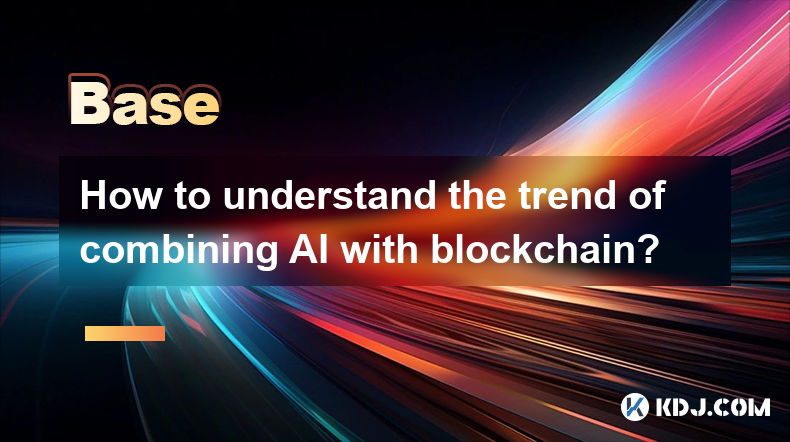
The trend of combining AI with blockchain is a significant development within the cryptocurrency circle, offering new possibilities for enhancing security, efficiency, and innovation. To understand this trend, it's essential to delve into the core concepts and applications of both technologies and how their integration can benefit the crypto ecosystem.
Understanding AI and Blockchain
AI, or Artificial Intelligence, refers to the simulation of human intelligence in machines that are programmed to think and act like humans. In the context of cryptocurrency, AI can be used for tasks such as market analysis, trading algorithms, and fraud detection.
Blockchain, on the other hand, is a distributed ledger technology that records transactions across numerous computers, ensuring transparency and security. Cryptocurrencies like Bitcoin and Ethereum are built on blockchain technology, which provides a decentralized and tamper-proof system for recording transactions.
The Synergy of AI and Blockchain
The integration of AI and blockchain can create a powerful synergy, enhancing the capabilities of both technologies. AI can leverage the secure and transparent nature of blockchain to improve its data handling and decision-making processes, while blockchain can benefit from AI's ability to analyze large datasets and automate complex tasks.
Applications in the Cryptocurrency Circle
Several applications of AI and blockchain integration are already making waves in the cryptocurrency circle. One prominent example is decentralized finance (DeFi), where AI algorithms can be used to optimize lending and borrowing processes on blockchain platforms. AI-powered smart contracts can also enhance the functionality of blockchain by enabling more complex and automated agreements.
Another application is fraud detection and security. By using AI to analyze transaction patterns on the blockchain, it is possible to detect and prevent fraudulent activities more effectively. AI can also help in managing and optimizing the mining process, making it more efficient and less energy-intensive.
Technical Implementation
To understand how AI and blockchain are combined technically, it's important to look at the specific tools and frameworks used. AI models can be trained on data stored on the blockchain, ensuring that the data used is secure and verifiable. Smart contracts can be programmed to execute AI-driven decisions, such as adjusting interest rates in DeFi platforms based on market conditions.
- Choose a blockchain platform that supports smart contracts, such as Ethereum or Binance Smart Chain.
- Develop or select an AI model that is suitable for the task at hand, such as a neural network for market analysis.
- Integrate the AI model with the blockchain by deploying it as a smart contract or using an off-chain AI service that interacts with the blockchain.
- Ensure data privacy and security by using cryptographic techniques and decentralized storage solutions.
Challenges and Considerations
While the combination of AI and blockchain offers many benefits, there are also challenges to consider. Data privacy is a significant concern, as AI models require large amounts of data, which must be handled securely on the blockchain. Scalability is another challenge, as both AI and blockchain technologies can be resource-intensive.
Additionally, regulatory compliance is crucial, as the use of AI in financial applications must adhere to existing laws and regulations. Ensuring the transparency and auditability of AI-driven processes on the blockchain is also essential for maintaining trust and integrity in the system.
Real-World Examples
Several real-world examples illustrate the practical application of AI and blockchain integration in the cryptocurrency circle. SingularityNET is a decentralized marketplace for AI services built on the Ethereum blockchain, allowing developers to create, share, and monetize AI algorithms. Ocean Protocol is another platform that combines AI and blockchain to enable data sharing and monetization in a secure and decentralized manner.
Crypto trading platforms are also adopting AI and blockchain technologies to enhance their services. For example, QuantConnect uses AI algorithms to analyze market data and execute trades, while leveraging blockchain for secure and transparent transaction recording.
Impact on the Crypto Ecosystem
The integration of AI and blockchain is having a profound impact on the crypto ecosystem. It is driving innovation by enabling new types of applications and services that were previously not possible. It is also improving the efficiency and security of existing processes, such as trading and transaction verification.
Moreover, the combination of AI and blockchain is fostering greater trust and transparency in the cryptocurrency circle. By using AI to analyze and verify data on the blockchain, it is possible to ensure that transactions and other activities are conducted fairly and securely.
Frequently Asked Questions
Q: How does AI enhance the security of blockchain transactions?
A: AI enhances the security of blockchain transactions by analyzing patterns and anomalies in transaction data. Machine learning algorithms can detect unusual activities that may indicate fraud or other malicious behavior, allowing for proactive measures to be taken to prevent such activities. Additionally, AI can be used to strengthen encryption methods and improve the overall security infrastructure of blockchain networks.
Q: Can AI and blockchain integration lead to new types of cryptocurrencies?
A: Yes, the integration of AI and blockchain can lead to the creation of new types of cryptocurrencies. AI-driven cryptocurrencies can incorporate advanced features such as adaptive supply mechanisms, automated governance, and enhanced privacy features. These new cryptocurrencies can leverage the strengths of both AI and blockchain to offer unique value propositions to users.
Q: What are the potential risks associated with using AI in blockchain applications?
A: There are several potential risks associated with using AI in blockchain applications. One risk is the potential for AI algorithms to be manipulated or biased, which could lead to unfair or inaccurate outcomes. Another risk is the vulnerability of AI systems to cyberattacks, which could compromise the security and integrity of blockchain networks. Additionally, the reliance on AI for decision-making could raise ethical and regulatory concerns, requiring careful consideration and oversight.
Q: How can individuals or businesses get started with integrating AI and blockchain?
A: To get started with integrating AI and blockchain, individuals or businesses can follow these steps:
- Educate yourself on the basics of AI and blockchain technologies, understanding their respective strengths and limitations.
- Identify a specific use case where AI and blockchain integration can provide value, such as improving transaction security or automating financial processes.
- Select appropriate tools and platforms, such as Ethereum for blockchain and TensorFlow for AI, based on the chosen use case.
- Develop a proof of concept to test the integration of AI and blockchain, ensuring that the solution meets the desired objectives.
- Iterate and refine the solution based on feedback and performance metrics, continually improving the integration of AI and blockchain.
Disclaimer:info@kdj.com
The information provided is not trading advice. kdj.com does not assume any responsibility for any investments made based on the information provided in this article. Cryptocurrencies are highly volatile and it is highly recommended that you invest with caution after thorough research!
If you believe that the content used on this website infringes your copyright, please contact us immediately (info@kdj.com) and we will delete it promptly.
- Kaspa (KAS) Price Prediction Hints at Accumulation Before Potential Surge
- 2025-04-17 22:15:13
- FET Price Prediction: Artificial Superintelligence Alliance (FET) Cryptocurrency Rebounds 10%
- 2025-04-17 22:15:13
- U.S. President Donald Trump Slammed Fed Chair Jerome Powell
- 2025-04-17 22:15:12
- Running a laundromat can't be as "easy" as potential investors may believe it is
- 2025-04-17 22:15:12
- BlockDAG (BDAG) Presale Explosion and Mobile Mining Powerhouse
- 2025-04-17 22:05:12
- Solana (SOL) Price Prediction: Eyes on $180 as Structure Turns Bullish
- 2025-04-17 22:05:12
Related knowledge
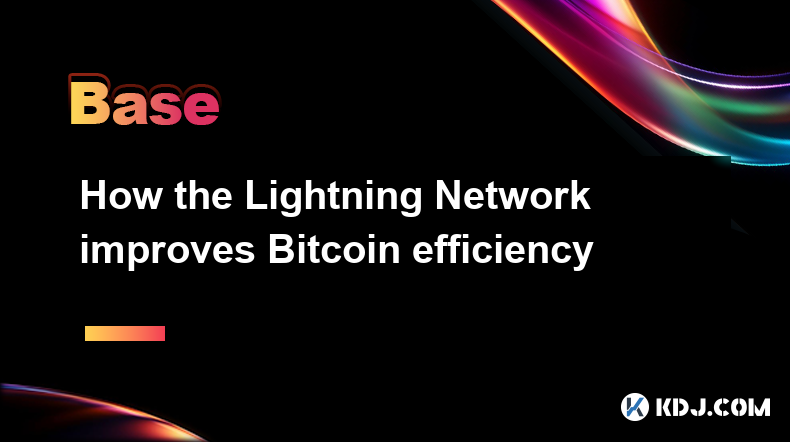
How the Lightning Network improves Bitcoin efficiency
Apr 17,2025 at 08:56pm
The Lightning Network represents a significant advancement in the Bitcoin ecosystem, aiming to address some of the most pressing issues related to transaction speed and cost. By enabling off-chain transactions, the Lightning Network drastically improves Bitcoin's efficiency, allowing for faster and cheaper transactions. This article will explore how the...

Analysis of the KYC process of cryptocurrency exchanges
Apr 17,2025 at 05:07pm
The Know Your Customer (KYC) process is a critical component in the operations of cryptocurrency exchanges. It serves as a regulatory measure to prevent fraud, money laundering, and other illicit activities. KYC procedures are designed to verify the identity of users and ensure compliance with financial regulations. This article delves into the various ...

What does Floor Price mean in the NFT market
Apr 17,2025 at 12:42am
The term Floor Price is a critical concept within the NFT (Non-Fungible Token) market, serving as a key indicator for both buyers and sellers. In essence, the floor price represents the lowest price at which an NFT from a particular collection is currently listed for sale on a marketplace. This price point is crucial for understanding the perceived valu...
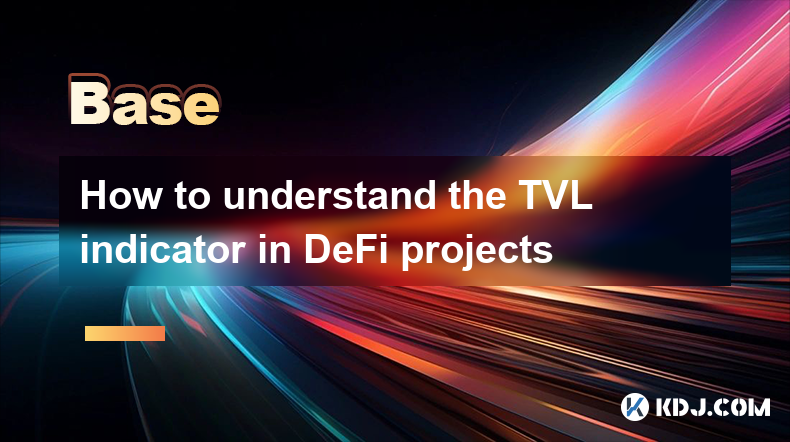
How to understand the TVL indicator in DeFi projects
Apr 17,2025 at 03:28pm
Understanding the TVL indicator in DeFi projects is crucial for investors and enthusiasts looking to gauge the health and popularity of decentralized finance platforms. TVL, or Total Value Locked, represents the total amount of assets that are currently staked or locked in a DeFi protocol. This metric serves as a barometer for the trust and interest tha...
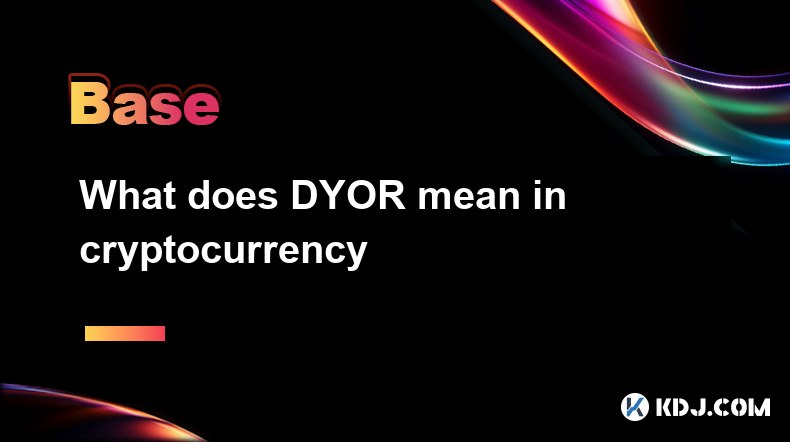
What does DYOR mean in cryptocurrency
Apr 17,2025 at 03:00pm
DYOR, or 'Do Your Own Research,' is a crucial mantra in the cryptocurrency community. It emphasizes the importance of individuals conducting their own thorough investigations before making any investment decisions. In the fast-paced and often volatile world of cryptocurrencies, relying solely on others' advice or the hype surrounding a particular coin c...
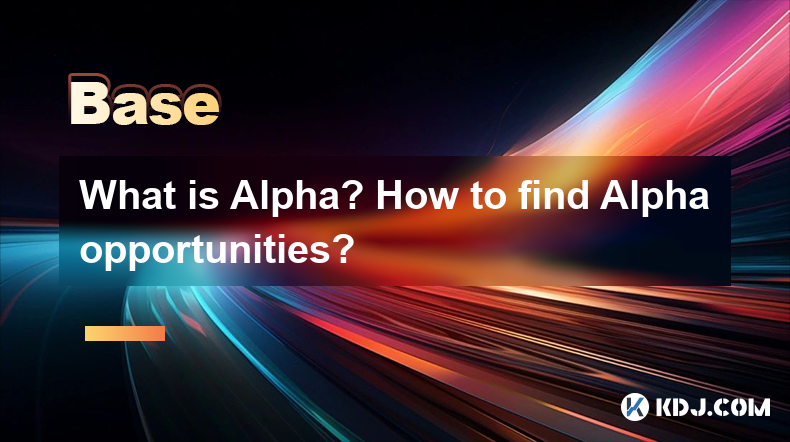
What is Alpha? How to find Alpha opportunities?
Apr 16,2025 at 12:42pm
What is Alpha?Alpha is a term widely used in the financial world, including the cryptocurrency market, to describe the ability of an investment to outperform a benchmark. In the context of cryptocurrencies, alpha refers to the excess return an investor achieves over the market's average return. For example, if the overall crypto market grows by 10% in a...

How the Lightning Network improves Bitcoin efficiency
Apr 17,2025 at 08:56pm
The Lightning Network represents a significant advancement in the Bitcoin ecosystem, aiming to address some of the most pressing issues related to transaction speed and cost. By enabling off-chain transactions, the Lightning Network drastically improves Bitcoin's efficiency, allowing for faster and cheaper transactions. This article will explore how the...

Analysis of the KYC process of cryptocurrency exchanges
Apr 17,2025 at 05:07pm
The Know Your Customer (KYC) process is a critical component in the operations of cryptocurrency exchanges. It serves as a regulatory measure to prevent fraud, money laundering, and other illicit activities. KYC procedures are designed to verify the identity of users and ensure compliance with financial regulations. This article delves into the various ...

What does Floor Price mean in the NFT market
Apr 17,2025 at 12:42am
The term Floor Price is a critical concept within the NFT (Non-Fungible Token) market, serving as a key indicator for both buyers and sellers. In essence, the floor price represents the lowest price at which an NFT from a particular collection is currently listed for sale on a marketplace. This price point is crucial for understanding the perceived valu...

How to understand the TVL indicator in DeFi projects
Apr 17,2025 at 03:28pm
Understanding the TVL indicator in DeFi projects is crucial for investors and enthusiasts looking to gauge the health and popularity of decentralized finance platforms. TVL, or Total Value Locked, represents the total amount of assets that are currently staked or locked in a DeFi protocol. This metric serves as a barometer for the trust and interest tha...

What does DYOR mean in cryptocurrency
Apr 17,2025 at 03:00pm
DYOR, or 'Do Your Own Research,' is a crucial mantra in the cryptocurrency community. It emphasizes the importance of individuals conducting their own thorough investigations before making any investment decisions. In the fast-paced and often volatile world of cryptocurrencies, relying solely on others' advice or the hype surrounding a particular coin c...

What is Alpha? How to find Alpha opportunities?
Apr 16,2025 at 12:42pm
What is Alpha?Alpha is a term widely used in the financial world, including the cryptocurrency market, to describe the ability of an investment to outperform a benchmark. In the context of cryptocurrencies, alpha refers to the excess return an investor achieves over the market's average return. For example, if the overall crypto market grows by 10% in a...
See all articles























































































